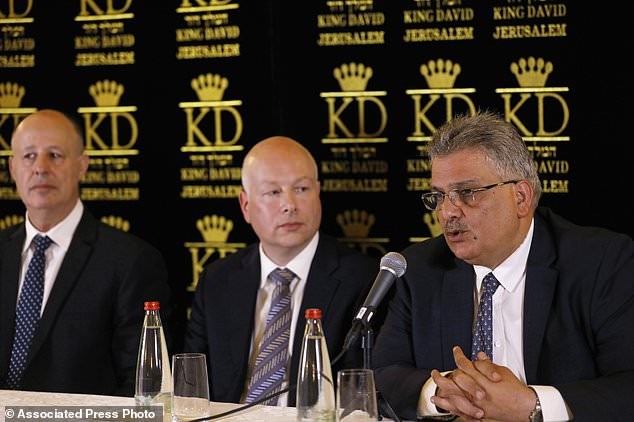A milestone agreement reached by Israel and the PA should have far-reaching benefits, particularly to the Palestinians, although it remains questionable whether it could help jumpstart peace negotiations.
Israeli and Palestinian negotiators announced a far-reaching agreement Thursday to provide the Palestinian Authority (PA) with 33 million cubic meters of water a year, as part of the Red Sea-Dead Sea Canal project.
At a press conference hosted by United States Special Representative for International Negotiations Jason Greenblatt, Israel’s Regional Cooperation Minister Tzachi Hanegbi and PA Water Authority Chairman Mazen Ghuneim, Greenblatt said the agreement, as well as a deal to open an electricity sub-station in Jenin, are examples of competing sides exhibiting a “pragmatic approach” to solving a regional issue together for the benefit of all sides.
“This agreement allows us to launch the Red-Dead project that is a crucial project for Jordan, Israel and the Palestinian Authority,” he said.
Hanegbi added that the deal “proves that water can serve as a means for reconciliation and cooperation.”
Greenblatt declined to comment on the administration’s efforts to get peace talks back on track, but all sides expressed hope that the water deal could serve as a jumping off point for further agreements.
“All of us in this room proved last night that water can serve as a means for reconciliation, for prosperity, for cooperation, rather than be a cause for tension and dispute,” Hanegbi said. “When you focus on the issues and not about history or background or personal emotions or other disturbing elements, the common denominator is much bigger than what separates us.”
Ghuneim said the agreement would help meet Palestinian needs but did not have any bearing on final status negotiations.
The hypothetical idea to link the Red Sea, at the southern tip of Israel, with the Dead Sea was first discussed in the late 19th century, but Israel and Jordan have been working together to bring the project to fruition since signing a peace agreement in 1994.
Development costs for the 180-kilometer pipeline vary, with estimates for the first stage of the project reaching as high as US$2.5 billion, to be financed by local governments, international contributions and private funding. The proposal calls for the construction of a desalination plant in Aqaba, Jordan, adjacent to Israel’s southern port of Eilat, to produce potable water for both cities and surrounding communities. Israel will receive 30-50 million cubic meters of drinkable water, with Jordan taking 30 million cubic meters.
Ecologists Warn of Ecological Disaster
Additional Red Sea water, combined with the salty brine residue from the desalination process, will also be piped north to the Dead Sea in an attempt to reverse the lake’s ongoing disappearance.The Sea – located 427 meters (1,400 feet) below sea level – is receding at a rate of one meter per year due because 95 percent of the Jordan River’s natural flow, which naturally runs from the Sea of Galilee to the Dead Sea, is diverted for drinking water and agricultural use by Israel, Syria and Lebanon. Ecologists say the site could dry up completely by 2050, which they say would be an ecological disaster to the lowest spot on earth as well as to the local ecosystem that relies heavily on the saltiest body of water in the word.
Experts also warn that the chemical composition of Red Sea water is different than waters found in the Dead Sea. They say that the best way to save the Dead Sea would be to restore the natural southward flow of the Jordan, while advising that pumping Red Sea water would also cause irreparable damage to the regional ecology.
Ghuneim said the Palestinians have a clear share in the project that would provide them with 32 million cubic meters a year, of which 22 million will go to Palestinians in Judea and Samaria and the remaining 10 million going to Gaza.
The Israel Electricity Company (IEC) and the PA on Monday signed the first commercial agreement between the two parties, which will increase the electricity supply in northern Samaria.
By: Andrew Friedman/TPS, World Israel News and AP


